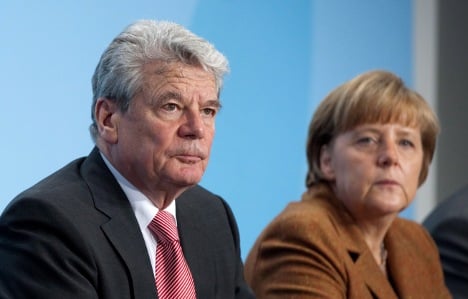Following the resignation in disgrace of Christian Wulff on Friday, Germany was set for an embarrassing search for its third head of state in two years. But by Sunday, there was a broad political consensus for the man Wulff defeated two years ago: Joachim Gauck.
The extremely popular eastern German pastor is now certain to become the country’s eleventh post-war president.
But choosing a successor forced the German chancellor, head of the Christian Democratic Union (CDU), into some damaging wrangling with her coalition partners the Free Democratic Party (FDP) over the weekend, according to the Westdeutsche Zeitung.
“The row over personnel briefly threatened to become a make-or-break test for the government,” the paper said. “Because unlike the CDU, the FDP heard the signals from the people and made the Gauck question into a coalition question. For Angela Merkel the ‘yes’ to Gauck is a painful submission to save the coalition.”
But other papers noted that the chancellor had much in common with her new president-in-waiting.
“They are two East Germans with roots in the Protestant church,” noted the right-wing daily Die Welt in its op-ed on Monday. “Both were not in the church resistance against the [communist party] from the beginning. But both rose politically during the reunification and the years of unity.”
While Merkel opposed Gauck’s extremely popular candidacy back in 2010, and needed three rounds of voting to force through her own candidate Christian Wulff, Die Welt says he is a unifying candidate that she can be happy with.
“He will be a strong president. His word will have weight next to Angela Merkel,” it said.
Another paper, Berlin’s Tagesspiegel, went so far as to suggest that agreeing to Gauck’s succession was Merkel’s canny rope-a-dope tactic. By suddenly supporting Gauck she wrong-footed the centre-left opposition Social Democratic Party (SPD) and the Greens – who supported him two years ago but may not be so happy with him now.
“Gauck is Merkel’s masterpiece,” the paper commented. “The most conservative president Germany has ever had is about to be elected – actively supported by the SPD and the Greens. On top of that, the chancellor, who skilfully spread the myth that she was against him until the end, can now wash her hands in innocence.”
And it’s true that while Gauck, a pastor and former human rights activist, seems the ideal candidate to unite the country after Wulff’s murky dealings, many of his positions seem much closer to the right than the left.
“He is someone who showed sympathy for the anti-immigrant theses of Thilo Sarrazin,” said the centre-left Süddeutsche Zeitung, “He ascribed ‘courage’ to the narrow-minded author.”
In the 20 months since his original candidacy failed, he has also spoken out against the “Occupy” movement, against Germany’s decision to drop nuclear power, and against those who opposed the Stuttgart 21 infrastructure development – the German left’s main rallying cries in the past two years.
The Süddeutsche Zeitung warned that the choice of Gauck might come back to haunt his political supporters. “Joachim Gauck is a skilful and authoritative man. His strength is a preacher-like pathos,” the paper says. “He is not a simple candidate. He is someone who thinks emotionally, talks emotionally, and sometimes acts emotionally. He will be an unpredictable president who will cause irritation.”
But popular daily Bild had nothing but glowing words for Wulff’s replacement.
“But what abilities should a good president have?” it asked. “More than anything he should master the one instrument he’s allowed to play: the spoken word, the art of the speech. He should have a clear value system and defend it courageously. And ideally he should have a life-story that makes him a figure of integration between East and West and Germans of all religions and different backgrounds.”
“Nearly one generation after the fall of the Wall, Germans have earned Joachim Gauck,” gushed Bild. “He is the ‘President of Hearts’ and the best qualified.”
The Local/bk




 Please whitelist us to continue reading.
Please whitelist us to continue reading.
Member comments